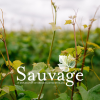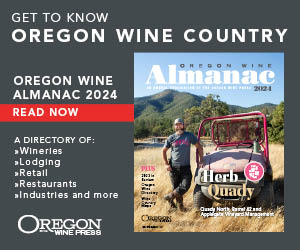South-Facing Fromage
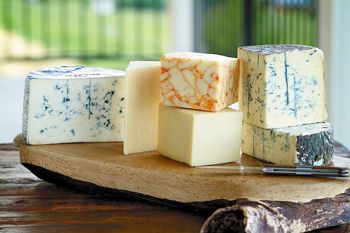
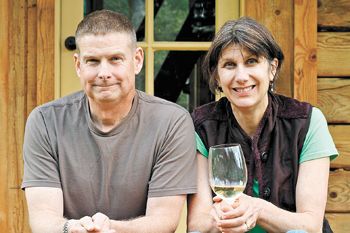
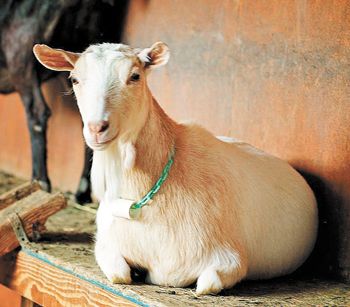
By Christine Hyatt
Southern Oregon is home to both the oldest continuously operating artisan creamery in the state as well as Oregon’s first off-the-grid creamery. This fertile valley is fairly isolated from major population centers, yet remains renowned for quality agricultural products, and the cheeses are no exception.
My final stop on the Oregon Cheese Trail video project took me to the bucolic Rogue Valley, an epicenter of fine cheesemaking renaissance that has blossomed in the state.
A decade ago, things did not look nearly so rosy for Oregon cheese. The early 2000’s saw the two remaining independent Oregon creameries, Bandon Cheese and Rogue Valley Creamery Cooperative, fall onto hard times. Bandon was sold to Tillamook County Creamery in 2000 and shuttered completely in 2005.
Rogue Creamery was limping along with only four employees and was slated for closure in July 2002. The moment seemed ripe for another artisan product to disappear. Instead, a chance encounter between cheesemaking icon Ig Vella and two entrepreneurs looking for the next challenge set the stage for a seismic shift in Oregon cheese.
This month, the creamery celebrates its first transformative decade under new leadership. Creamery owners David Gremmels and Cary Bryant expanded the operation from just four employees to a team of 40 today and incorporated a clear vision of innovation, which not only revived the business but has taken it to stratospheric heights.
Team Rogue reimagined what blue cheese could be, expanding the product line from two classic blues to nine and transforming the creamery from a small, relatively obscure regional player to the celebrated winner of top national and international awards.
Not content to resuscitate only their own creamery, Gremmels and Bryant originally set their sights on bringing together cheesemakers throughout the state for educational opportunities and marketing. The first Oregon Cheese Festival was held at the creamery in 2005; there, plans were hatched for the Oregon Cheese Guild, which officially formed at the 2006 festival.
The “rising tide lifts all boats” ethos upon which the guild was founded was a cornerstone in improving the quality of Oregon cheese through education and networking as well building the reputation and awareness of Oregon cheese in the state and on a national level.
Thirteen cheesemakers were charter members of the guild, including the then-newly licensed Pholia Farm. Owners Vern and Gianaclis Caldwell and their daughters, Phoebe and Ameila (for whom the farm is named), returned to undeveloped family land in Rogue River after Vern’s retirement from the U.S. Marine Corps.
Their vision: Build an off-the-grid homestead, farm, dairy and creamery using the milk of their small herd of Nigerian Dwarf goats. Amelia raised the animals as part of a 4-H project and the rest of the family was charmed enough to consider cheesemaking a viable option for their “second act” career.
Upon returning to land that had been in Gianaclis’ family since the 1940s, there was nothing on the property; and the subsequent decision to be responsible for their own energy use was the catalyst for many aspects of the operation. The size of the creamery, aging facilities and dairy, as well as the type of cheese they would produce, were determined by how much power could consistently be generated through solar and seasonal micro-hydro power for both cheesemaking and home use.
The small-by-design operation is milking at peak capacity — 35 does — and produces just over a thousand pounds of cheese a year. The decision to be off the grid also reinforced their decision to produce only raw milk cheese, since pasteurization, an energy-intensive first step, was beyond their means.
The Nigerian Dwarf breed is not a traditional dairy goat and the Caldwells were among the first champions of the uniquely rich milk, similar to sheep’s milk in its complex flavor and fine aging ability. What these goats lack in size and volume of milk produced, they make up in milk rich in cheesemaking components.
The farm produces aged cheeses to accommodate the 60-day aging rule required for raw milk cheeses Elk Mountain and Hillis Peak, which are available at select cut-to-order cheese counters in the Northwest and beyond. Dense and flavor-packed, the cheeses are richly satisfying.
In a mere seven years, Pholia Farm has matured from a startup micro-creamery into a leader in the farmstead movement, inspiring other producers around the state and country through onsite classes in animal husbandry, farmstead cheesemaking and two books by Gianaclis: “The Farmstead Creamery Advisor” (2010) and the forthcoming “Mastering Artisan Cheesemaking.”
In her second book — written with the home cheesemaker and the small-scale producer in mind — Gianaclis focuses on the science of cheesemaking in a process-oriented way, deconstructing recipes to showcase how small changes along the way can make a big difference in the final cheese.
The Caldwells made a wide variety of cheeses while writing the book and these one-of-a-kind products can only be sampled and savored by visiting the Ashland Farmers Market on Tuesday mornings.
Though quite far off the beaten path geographically, the contributions of these two Southern Oregon producers to the wider world of cheese through their innovative and delicious products, information sharing and community-minded spirit will continue to influence the next generation of cheesemakers and cheese lovers in a remarkably positive way.



